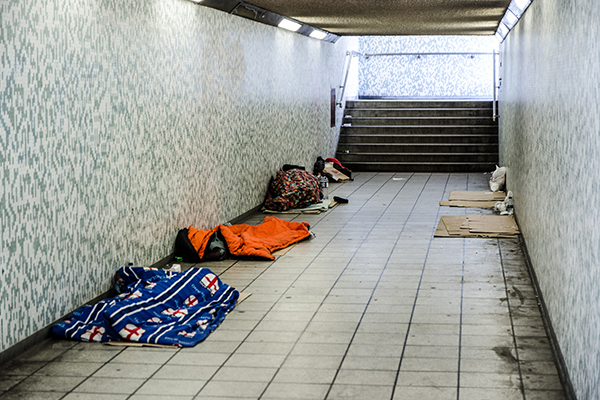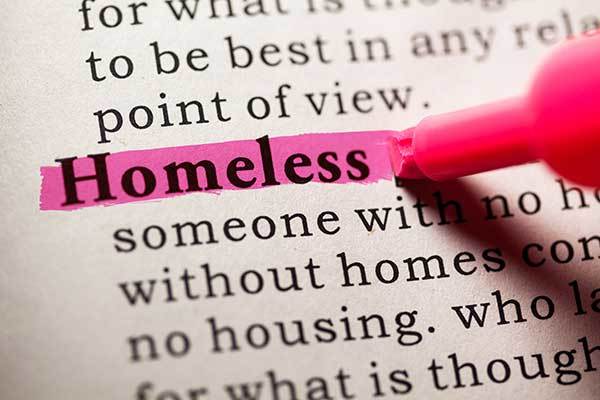You are viewing 1 of your 1 free articles
 Jules Birch
Jules BirchThe blindingly obvious solution to the rising costs of homelessness
Jules Birch looks at the rising costs of homelessness and temporary accommodation and argues the solution is obvious – allow councils to build lots more social housing.
As fast as homelessness is rising, the costs of homelessness are rising even faster.
The more that central government claims to be providing extra money, the more local authorities seem to be left to pick up the bill.
Those are the conclusions of two reports over the weekend that highlight the scale of the problems at the sharp end of the housing crisis.
The first comes from analysis for the Local Government Association (LGA) that found that that the number of families in bed and breakfast has risen 187% in less than a decade, from 2,450 in 2008/09 to 7,040 in 2017/18.
Shocking though that is, it’s hardly a big surprise given the impact of austerity and welfare ‘reform’ during the same period.
“While the Homelessness Reduction Act was passed with all-party support, there were warnings from the very beginning that the funding would be insufficient”
What’s really shocking is the rise in the cost of keeping them in the worst form of temporary accommodation – an incredible 780% from £10.6m in 2009/10 to £93.3m in 2017/18.
The second comes from independent research conducted for London Councils on the cost of implementing the Homelessness Reduction Act, the legislation that the government hopes will focus local efforts on homelessness prevention.
It found the cost of homelessness prevention and relief cases in London is £2,500 per case, almost five times higher than the £530 figure that the government used to award ‘new burdens’ funding to councils.
That funding to implement the act totalled £73m over three years for England as a whole, of which London councils received £30.2m.
But the report by LSE London estimates the cost in London alone at £80m by 2022/23, leaving London boroughs to find £50m from their own resources with the new burdens funding due to end in March next year.
While the Homelessness Reduction Act was passed with all-party support, there were warnings from the very beginning that the funding would be insufficient and things are set to get even worse unless the government changes its mind in response to a call for evidence that ends on Tuesday.
But this is just part of a wider funding gap that will see London boroughs forced to raise almost a quarter of the costs of homelessness services from their general funds – £237m out of more than £1bn a year by 2022/23 – unless funding arrangements are changed.
True, both of these warnings come from local authority groups with a stake in delivering them, but they are consistent with the way that central government has devolved so many of the financial consequences of homelessness to them.
One of those was highlighted in an excellent investigation by Tom Wall in The Observer on Sunday into the private management companies that are profiting from the growth an institutionalisation of temporary accommodation.
The top five providers in his Freedom of Information (FOI) research received more than £7m each last year for their services. The accommodation included cramped hostel rooms infested with bedbugs and a squalid and dangerous former office block.
Yet local authorities in high-cost areas such as London feel they have no choice but to work with them given the scale of the problem.
The latest homelessness statistics show that there are 84,740 households in temporary accommodation including 126,000 children. Two-thirds of them are in London.
As ministers are fond of pointing out, both of those figures were higher under Labour in the mid-2000s, but that was before a major homelessness prevention drive that was successful because it was properly funded.
“The obvious answers lie in repairing the welfare safety net and, of course, building lots more homes for social rent”
Both figures are almost double what they were in 2010 and the biggest increases have come in B&B and nightly paid accommodation where providers can charge the most.
At the same time, the number of families in temporary accommodation outside their own district has quadrupled.
The costs of all this were laid out comprehensively by Crisis in a report last year – but it’s not just about the costs. Research for it by PriceWaterhouseCoopers estimated that ending homelessness would deliver benefits of more than £50bn over the next 25 years.
On top of specific interventions such as Housing First and properly funded prevention, the obvious answers lie in repairing the welfare safety net and, of course, building lots more homes for social rent.
Last week brought some good news on that front as Freedom of Information research by Nathaniel Barker for Inside Housing revealed that 240 councils are planning to build more than 77,000 homes over the next five years.
It’s not clear how many of those will be for social rent given that almost half of the homes will come via local housing companies and general fund investment that may be aimed more at boosting councils’ finances rather than addressing housing need but it’s still good news.
Unfortunately it coincided with bad news last week as the Treasury increased the cost of new borrowing from the Public Works Loans Board by 1% with immediate effect.
The move seems aimed at curbing the ambitions of councils that have been borrowing to buy office blocks and shopping centres to generate new revenue streams to cope with austerity.
But the impact could be devastating for those who want to get back into council housing as the LGA estimates it could add £70m a year to their borrowing costs.
This despite the fact that we know that building council housing will generate a return to the public finances without any of the gambling involved in buying commercial property.
Allowing councils to take advantage of ultra low interest rates to build social housing to tackle homelessness, cut the number of families in temporary accommodation and save money in the long run seems so blindingly obvious that it should not need saying.
Somehow it still does – and we need to keep saying it loud and clear.
Jules Birch, award-winning blogger
At a glance: Homelessness Reduction Act 2017
The Homelessness Reduction Act 2017 came into force in England on 3 April 2018.
The key measures:
- An extension of the period ‘threatened with homelessness’ from 28 to 56 days – this means a person is treated as being threatened with homelessness if it is likely they will become homeless within 56 days
- A duty to prevent homelessness for all eligible applicants threatened with homelessness, regardless of priority need
- A duty to relieve homelessness for all eligible homeless applicants, regardless of priority need
- A duty to refer – public services will need to notify a local authority if they come into contact with someone they think may be homeless or at risk of becoming homeless
- A duty for councils to provide advisory services on homelessness, preventing homelessness and people’s rights free of charge
- A duty to access all applicants' cases and agree a personalised plan














